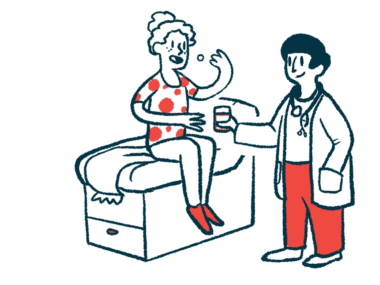FDA OKs clinical testing of new cell therapy for hard-to-treat gMG
New trial will test CAR T-cell therapy in patients in US, developer says
Written by |

The U.S. Food and Drug Administration (FDA) has given the green light to Iaso Bio to start clinical testing of its BCMA CAR T-cell therapy equecabtagene autoleucel, known as Eque-cel for short, in people with generalized myasthenia gravis (gMG) who live in the U.S.
Clearance of the company’s request, which came in the form of an investigational new drug (IND) application to the FDA, follows a recently published investigator-initiated study detailing how the cell therapy led to sustained physical function gains in two people with hard-to-treat myasthenia gravis in China.
“We are very pleased that Eque-cel has been approved for clinical trial for gMG in the United States,” Jinhua Zhang, founder and chairman of Iaso Bio, said in a company press release.
“This is Iaso’s first IND approval in the US to apply CAR-T therapies in autoimmune diseases,” Zhang said.
An IND application in China for this indication of Eque-cel was approved by Chinese regulatory authorities in January, the company said.
Use of CAR T-cell therapy helps 2 MG patients in China study
In MG, an immune-mediated attack against proteins involved in nerve-muscle communication leads to muscle weakness. As many as 40% of patients have ocular MG, which is marked by weakness in the muscles that control eye and eyelid movements. gMG, meanwhile, is characterized by widespread muscle weakness and fatigue, and is estimated to occur in about 85% of MG patients.
Despite advances in MG treatments, as many as one-fifth of patients do not adequately respond to available therapies, according to an earlier study. A lack of treatment response among people with the chronic autoimmune condition can adversely impact physical functioning and quality of life.
“The existing treatment options for autoimmune diseases are limited,” said Wei Wang, PhD, of the Huazhong University of Science and Technology, in China, and the study’s principal investigator.
“Autoimmune diseases are difficult to cure, and recurrent attacks bring great physical and psychological burden to patients and their families,” Wang said.
Self-reactive antibodies produced by immune B-cells are the primary drivers of MG.
Eque-cel, also known as CT103A, comprises immune T-cells modified with a lab-made chimeric antigen receptor (CAR) that binds to a B-cell receptor protein called BCMA. This binding destroys disease-driving BCMA B-cells, which should lower the levels of self-reactive antibodies and ease MG symptoms.
Two people with hard-to-treat MG received Eque-cel as part of an investigator-initiated, early open-label Phase 1 study (NCT04561557) sponsored by the Tongji Hospital, in China. Both patients were treated with a single dose of the CAR T-cell therapy, alongside low-dose pyridostigmine (sold as Mestinon) that was given during follow-up.
“In collaboration with Iaso Bio, we have taken the lead in applying BCMA CAR-T, an advanced cell therapy, to a variety of serious autoimmune diseases, including MG,” Wang said.
No details from Iaso Bio as yet on start of clinical testing in US
Starting three months after the infusion, the two patients showed significant improvement in limb strength and lung function. Sustained improvements also were seen in functional disability scores, as indicated by the Quantitative MG (QMG) score, the MG-Activities of Daily Living (MG-ADL), and the MG Quality of Life (MG-QOL) questionnaire.
Anti-BCMA CAR T-cells expanded well after the infusion, resulting in the elimination of B-cells, which dropped to undetectable levels after two months in both patients. Although these B-cells returned to normal levels after 18 months, most were new and had yet to be activated; meanwhile, the numbers of antibody-producing B-cells remained low. At the same time, the levels of self-reactive antibodies dropped in both patients.
One patient had grade 1 (mild) cytokine release syndrome (CRS), a body-wide inflammatory response caused by the rapid release of immune signaling proteins. This issue resolved on its own within one day. Both patients experienced a drop in immune neutrophil and lymphocyte counts, which resolved after a month.
Zhang said Iaso Bio as very pleased with the results of this early clinical testing.
“Seeing patients with severe autoimmune diseases who have been repeatedly tormented by the disease and cannot take care of themselves return to normal life after treatment with Eque-cel is the biggest motivation for our R&D [research and development] effort,” Zhang said.
“I would like to thank the clinicians who helped us conduct the clinical trial, and the patients and their families who participated in the clinical trial for their trust in us,” Zhang said, adding that the company is “committed to expanding breakthrough cell therapies to a broader range of autoimmune diseases.”
The US [investigational new drug application] approval of Eque-cel for the treatment of gMG, a [severe] autoimmune disease, represents a recognition [by] the FDA of the potential clinical value of our research direction.
To that end, Iaso Bio also is testing the cell therapy in patients with hard-to-treat multiple myeloma, a type of blood cancer, and has indicated that it plans to expand the therapy’s use to other autoimmune diseases.
No further information was provided regarding upcoming clinical testing of Eque-cel in the U.S. However, Wang noted the importance of the FDA clearance in the development of the therapy for gMG patients.
“The US IND approval of Eque-cel for the treatment of gMG, a [severe] autoimmune disease, represents a recognition [by] the FDA of the potential clinical value of our research direction,” Wang said.




Leave a comment
Fill in the required fields to post. Your email address will not be published.